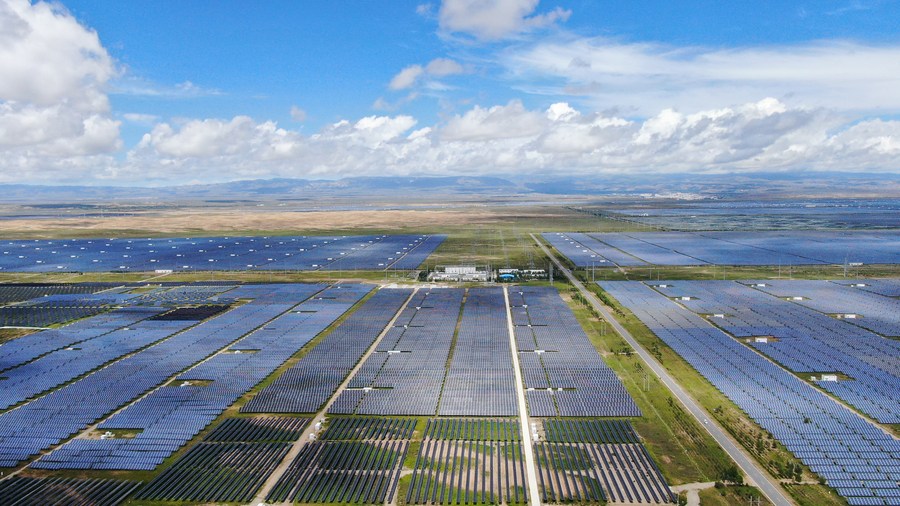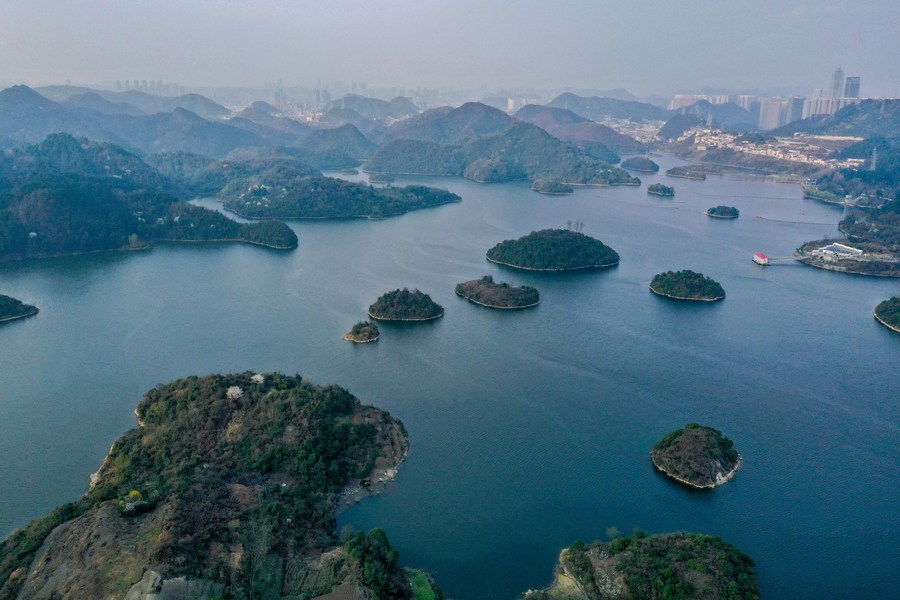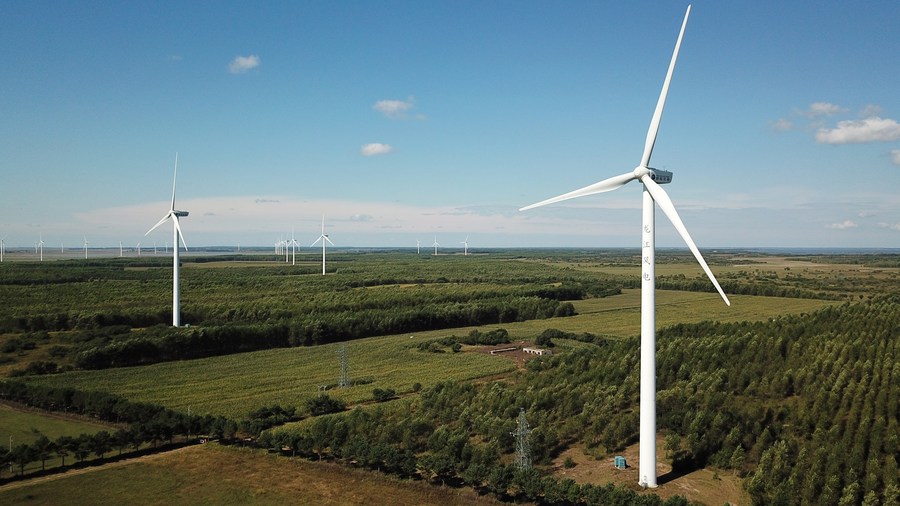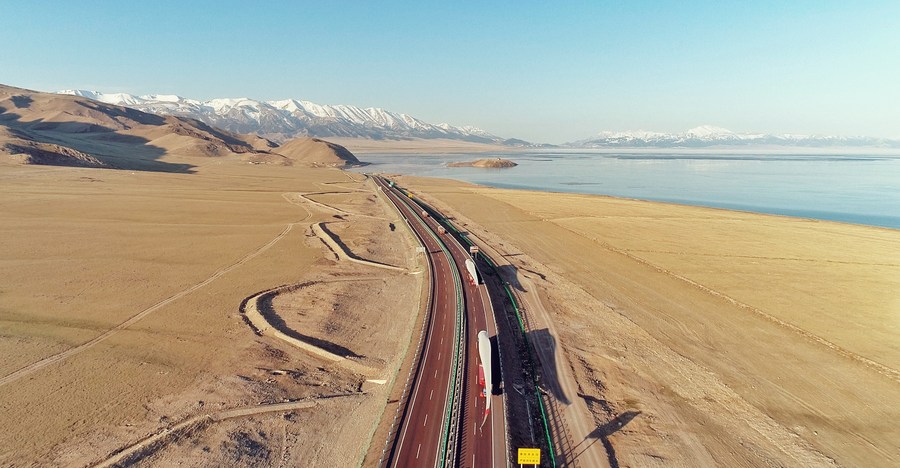China means what it says in reducing carbon emissions: ambassador

Aerial photo taken on Aug. 17, 2020 shows a photovoltaic power station at the green industrial development park in the Tibetan Autonomous Prefecture of Hainan, northwest China's Qinghai Province. (Xinhua/Zhang Long)
China is serious about reducing carbon emissions and pursuing green development, according to Chinese Ambassador to Britain. The country met its target for 2020 ahead of schedule as the carbon emissions intensity had come down by 48 percent by the end of last year compared with 2005.
LONDON, Oct. 27 (Xinhua) -- China will honor its pledges to reduce carbon emissions and any worries about it failing to do so is unnecessary, Chinese Ambassador to Britain Zheng Zeguang said in an article published on The Guardian on Wednesday.
"Anyone who knows China well is sure that my country is serious about reducing carbon emissions and pursuing green development, and that we mean what we say," Zheng said in the article published days ahead of the 26th United Nations Conference of Parties on Climate Change (COP26) in Glasgow, Scotland
Last year, China announced that it will strive to peak carbon emissions before 2030 and achieve carbon neutrality before 2060, he said. These commitments were reiterated last month at the UN general assembly, with the further announcement that China will not build any more coal-fired power stations overseas.
Earlier this month, at the 15th meeting of the Conference of the Parties to the UN Convention on Biological Diversity, known as COP15, Chinese President Xi Jinping called for joint efforts in building a community of all life on Earth, and proposed major policies for the preservation of biological diversity, he added.

Rescuers feed a sick baby elephant abandoned by its herd in Xishuangbanna Dai Autonomous Prefecture, southwest China's Yunnan Province, Aug. 29, 2021. (Xishuangbanna Asian Elephant Breeding and Rescue Center/Handout via Xinhua)
As a result of China's leadership, the Kunming declaration has been adopted and the Kunming biodiversity fund set up, with China committing an initial capital contribution of 1.5 billion yuan (about 235 million U.S. dollars), he said.
"This is a testimony to the resolve and determination of China's top leader to protect the ecosystem and tackle climate change," he said.
Zheng noted that in China, it is already a national consensus that "lucid waters and lush mountains are mountains of gold and silver" -- an idea proposed by Xi. Ecological conservation has been one of the "five prongs" of the overall plan for the country's development since the 18th congress of the Communist Party of China (CPC) in 2012.

Aerial photo taken on Feb. 24, 2021 shows the scenery of Ahahu national wetland park in Guiyang City, southwest China's Guizhou Province. (Xinhua/Ou Dongqu)
Anyone familiar with China's political system knows that once decisions and goals are set by the CPC central committee and the top leader, they are incorporated into the overall national development program, turned into feasible action plans and delivered faithfully by local governments and competent departments, the ambassador said, noting that is how the country has achieved its development miracle over the 72 years since the founding of the People's Republic of China.
In terms of climate action, China met its target for 2020 ahead of schedule, he said. By the end of last year, carbon emissions intensity had come down by 48 percent compared with 2005, and non-fossil fuels accounted for 16 percent of primary energy consumption.

Aerial photo taken on Sept. 8, 2021 shows a wind farm of the Daqing wind power project in Daqing, northeast China's Heilongjiang Province. (Xinhua/Wang Jianwei)
China is also doing what it can to help build up climate response capabilities in developing countries, he said. From supporting Africa in monitoring the climate system with satellite technology and building low-carbon pilot zones in southeast Asia, to introducing energy-saving bulbs to small island countries, China's cooperation with less developed regions of the world has produced tangible results.
China has also launched green action initiatives that encourage green infrastructure, energy, transportation and finance under the Belt and Road Initiative (BRI) framework, he said.
In 2020, 57 percent of China's energy investment in BRI partner countries went to renewable energy projects, up from 38 percent in 2019, he said, adding that such efforts will continue.

Photo taken on April 24, 2020 shows trucks loaded with wind turbine blades running on a road along the Sayram Lake basin in northwest China's Xinjiang Uygur Autonomous Region. These wind turbine blades are used for a 50-megawatt wind farm in Kazakhstan's Kostanay Region. (Universal Energy/Handout via Xinhua)
Meanwhile, the ambassador said the international community should recognize that, for a developing country with a population of over 1.4 billion that has not completed industrialization or urbanization, the nationally determined contributions (NDCs) and the supporting policy measures that China has adopted voluntarily have not been easy.
He expressed hope that the international community should aim to complete the negotiations of the Paris rulebook (market mechanisms in article six in particular) and push for progress on issues of concern to developing countries, namely adaptation and financing. The principles of equity -- common but differentiated responsibilities and respective capabilities -- should be upheld.
Developed countries with a couple of hundred years of industrialization behind them and historical environmental debts should make bigger contributions to tackling pollution and protecting the environment, instead of pinning the responsibility on China and other developing countries, he said.
Developed countries must shoulder their obligations and take the lead in drastically cutting emissions -- a key to achieving global net-zero emissions, he said. They also need to help developing countries speed up the green and low-carbon transition by significantly increasing support to them through financing, technology and capacity building, and avoid putting up green trade barriers.

An electric bus runs on the street in London, Britain, Aug. 9, 2021.(Xinhua/Han Yan)
"All countries must keep their word rather than just pay lip service" in order to strengthen international mutual trust, he said, noting that the longstanding pledge by developed countries to provide 100 billion dollars a year in climate finance to developing countries by 2020 has yet to be fulfilled.
China and Britain, as countries of global influence, should work together to implement the important understanding between the leaders of the two countries, so as to strengthen the synergy between COP15 and COP26, contribute to a successful conference in Glasgow, and promote full and effective implementation of the Paris agreement, the ambassador said.
Photos
Related Stories
- "Power highways" push forward carbon emission reduction in China
- Panda-shaped photovoltaic plant demonstrates China's firm effort on cutting carbon emission
- China to rectify "campaign-style" carbon reduction: NDRC
- China sets in motion national carbon emission trading market
- China to build a community of life for man and nature with rest of world
Copyright © 2021 People's Daily Online. All Rights Reserved.










